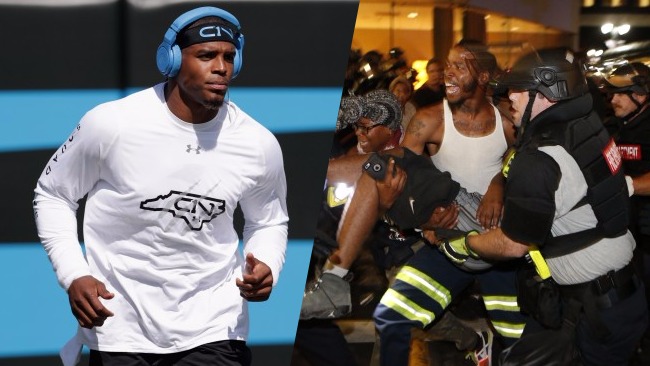
Colin Kaepernick’s protest of the national anthem touched off a wave of political engagement from athletes the likes of which we likely have never seen before. There’s been a discussion of the responsibility of athletes to speak out and effect change across the country, in both healthy and unhealthy ways. Sure, there have been more protests of the anthem in the NFL, and debates about similar protests in other sports, but there’s also been Iman Shumpert’s donation pledge. It’s just been great to see, from a social perspective.
Yet one of the most famous athletes of color in our time, Cam Newton, has remained all but silent on the issue of systemic racism in America — and when he did speak out, he did so in seriously disappointing fashion, claiming, “I don’t want this to be about race, because it’s not. It’s not. Like, we’re beyond that. As a nation.”
It’s an insinuation that white people have used for years to abdicate responsibility for any further progress in race relations in the country, and it was heartbreaking to some to hear it from Cam’s mouth. Well, it seems as if the protests in Charlotte over the killing of Keith Lamont Scott have finally woken Cam up, because he has changed his tune considerably.
A very open @CameronNewton when asked about the events that took place in CLT yesterday. #Panthers #CamNewton #NFL pic.twitter.com/e2rQ3G9Zn1
— Ashley Stroehlein (@ashstro) September 21, 2016
Here are his most relevant comments, from Sports Illustrated:
“I’m believer of justice and I’m a firm believer of doing the right thing,” Newton said. “I’m an African American. I’m not happy with how justice has been dealt with over the years, the state of oppression in our community. We also, as black people, have to do right by ourselves. We can’t be hypocrites. It’s not the fact that things are happening, it’s the way that they’re being treated after they happen.
“I say that on one voice but also on another voice that when you go public or when things happen in the community, it’s not the fact that things are happening. It’s the way they’re being treated after they’re happening. When you get a person that does some unjust things or killing an innocent person, killing fathers, killing people who have actual families. That’s real.”
Cam is taking his first steps into a public racial conscience, so he can be forgiven for being a bit clumsy (even if implying a concern about black-on-black crime was a disappointing false equivalence). The key is that Cam is addressing what is going on around them and identifying with those crying out for justice. The more people who do that, the stronger those cries are.






